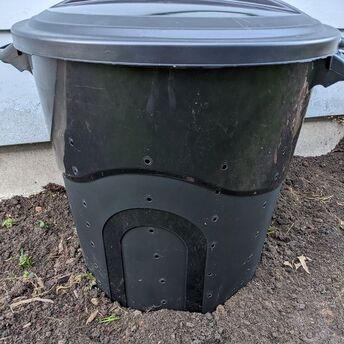 The other day I made the first of what will (hopefully) become two compost bins at our house. You can check out the finished product in the picture on the left. Prior to this new "system," my spouse and I had simply used the "open air" approach in which we dug a shallow hole in the ground, put a crude wooden structure around the hole like a fence, and kept adding items to it. We would stir it from time to time, but the reality is that it took a lot of extra effort to get to the little bit of compost that was created at the bottom of the pile. We desperately need to improve the quality of the soil at our house--for the garden and the perennial beds, so my spouse and I began researching what would work better for our small space. And by "researching," I mean mostly watching YouTube. Which is where we found this idea: A garbage can with a locking lid with 7 or 8 two-inch holes drilled in the bottom, leveled and partially buried in the ground with about 100 holes drilled in the sides all the way around the body of the can. I added equal parts browns and greens (i.e. dried leaves and fresh grass clippings), added the contents from our indoor compost pail (which is a really cute Aldi find, by the way)--things like potato peels, coffee grounds, and eggshells, etc. I then mixed it up and wet it all down, making it--hopefully--a wonderfully attractive place for worms and bugs to turn it into compost. If I'm being honest, this whole process just amazes me. Think about it, we dump in all of these undesirable things--things that appear to be worthless and discard-worthy, the leftovers of our lives--and then we wait for Creation to turn it into something beautiful, desirable, and useful. We heap dead thing after dead thing into this container and wait for life to emerge. It's delightful, it's compost, and it's good news. And it's good news because of the hope that compost conveys. Journalist Jeff Chu explains, "A robust theology of the compost reminds us that we are still in the process of becoming, and God has written redemption into the story of creation itself. A robust theology of the compost reminds us that God has empowered us lowly worms to turn what is ugly and festering and dying into what is lovely and beautiful and life-giving. A robust theology of the compost testifies to the fact we can't do this alone, but we need others, because a single worm can't do very much but in community they have tremendous power. A robust theology of the compost testifies that we who have been told by society that we are worthless can act in the confidence of the knowledge that we are worthy. And a robust theology of the compost testifies that God urges those of us who have been shamed not to shame, but instead to love. Because in our acts of love we participate in preparing the soil in which God's reign of love and justice can take root." So, my fellow tenders of the land, take heart! Hope remains even though the soil of our lives may appear worthless, depleted, and dead. Hope remains even though it feels like we can't do much to turn things around because we don't labor alone. Hope remains as we work the land on which we find ourselves to prepare the soil for the kin-dom of God--the kin-dom of love and justice and LIFE--to take root. Out here, dear people--hope most certainly remains. Composting a rich, lovely, and life-giving faith with you, Pr. Melissa Comments are closed.
|
Rev. Melissa Sternhagen
Rev. Melissa Sternhagen was called as the pastor of St. Paul Congregational UCC in June of 2020. Prior to her call to St. Paul, Pr. Melissa worked as a hospice chaplain in the Ames, IA area, following pastorates at rural churches in Central Iowa and Southern Illinois. Pr. Melissa is a second-career pastor with a background in agribusiness and production & supply operations. She received her M.Div. from Eden Theological Seminary in St. Louis, MO, and holds a MA Ed. in Adult Education and Training, and a BA in Organizational Communications. Archives
July 2024
Categories |

 RSS Feed
RSS Feed
